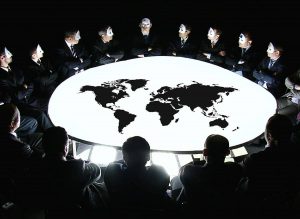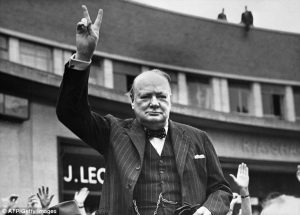The Imperial Political Elite Establishment’s Strategies for Protecting British Power
THE FIRST AIM OF BRITISH FOREIGN POLICY MEMORANUM BY THE SECRETARY OF STATE FOR FOREIGN AFFARIS
“It must be recognised that the Soviet Government has formed a solid political and economic block behind a line running from the Baltic along the Oder, through Trieste to the Black Sea. There is no prospect in the immediate future that we shall be able to re-establish and maintain normal relations with European countries behind that line. As I have explained in a separate paper, these countries are dominated by the Communists, although they are only a minority in each country. Indeed, we shall be hard put to it to stem the further encroachment of the Soviet side. It is not enough to reinforce the physical barriers which still guard our Western civilisation. We must also organise and consolidate the ethical and spiritual forces inherent in this Western civilisation of which we are the chief protagonists. This in my view can only be done by creating some form of union in Western Europe. Whether of a formal or informal character, backed by the Americans.”43 The announcements which followed were:
A- The deadline for the independence of India was brought forward.
B- The Palestine issue was handed over to the United Nations.
C- Notice was given that British assistance to Greece and Turkey had to cease.
These were viewed by the Americans as an indication of a certain loss of imperial will or, alternatively, of imperial muscle and money – the latter interpretation being reinforce by British hints that an economically ruined Europe would never be able to resist Communism. The response of the United States is well-known: the proclamation of the Truman Doctrine, pledging support to friendly states under threat, and the assumption of British responsibilities towards Greece and Turkey by the Americans were soon followed by the announcement of the Marshall Aid Scheme for economic reconstruction.
Bevin also went on in his memorandum of the 4th January 1948 by saying, “Material aid will have to come principally from the United States, but the countries of Western Europe which despise the spiritual values of America will look to us for political leadership and moral guidance and for assistance to build up a counter attraction to the baleful tenets of Communism within their borders and in recreating a healthy society wherever it has been shaken or shattered by the war. I believe we have the resources with which to perform this task.”44 Then, in the concluding paragraph, he said, “provided we can organise a Western European system, backed by the power and resources of the Commonwealth and of the Americans, it should be possible to develop our own power and influence to equal that the United States of America.”45
In fact, the Churchillian idea of Britain standing at the centre of three interlocking circles: the Atlantic Circle, the Commonwealth, and Western Europe had always been shared by Bevin. “Bevin’s outlook was unreservedly Atlanticist, and any interest he may have shown in European unity sprang from his belief in the imperative necessity of obtaining an American commitment. All the available evidence suggests that from the beginning his policy was shaped towards this end.”46 Ernest Bevin’s faith that Britain should remain a major power was stated in the following terms:
“His Majesty’s Government do not accept the view… that we have ceased to be a Great Power, or the contention that we have ceased to play that role. We regard ourselves as one of the Powers most vital to the peace of the world and we still have our historic part to play. The very fact that we have fought so hard for liberty, and paid such a price, warrants our retaining that position; and indeed, it places a duty upon us to continue to retain it. I am not aware of any suggestion, seriously advanced, that by a sudden stroke of fate, as it were, we have over night ceased to be Great Power.”47
Notes:
1. S.E. FINER, Comparative Government, (Middlesex: Penguin, 1970), p. 132.
2. G.A. JONES, The Political Structure, (London: Longmans, 1969), p. 54.
3. ibid.
4. ibid., pp. 54-55.
5. ibid., p. 53.
6. S.E. FINER, OP. cit., p.151.
7. ibid., pp. 169-170.
8. ibid., p. 174.
9. ibid.
10. G.A. JONES, OP. cit., p. 55.
11. ibid.
12. S.E. FINER, OP. cit., p. 158.
13. T. SOPER, Evolving Commonwealth, (London: Pergamon Press, 1965), p. 96
14. L.A. MONK, Britain 1945-1970, (London: G.A. Bell, 1976), p. 17.
15. ibid., p. 18.
16. R. EATWELL, The 1945-1951 Labour Governments, (London: Batsford Academic, 1979), p. 32.
17. ibid., p. 36.
18. C.J. BARTLETT, A History of Post-War Britain 1945-1974, (London: Longman, 1977), p. 24.
19. ibid.
20. ibid.
21. D. JUDD and P. SLINN, The Evolution of the Modern Commonwealth 1902-80, (London: McMillan, 1982), p. 87.
22. V. ALBERTINI, Decolonization, (London: Africana Publishing, 1982), p. 115.
23. ibid.
24. ibid.
25. ibid., p. 116.
26. ibid.
27. S.E. FINER, OP. cit., p. 165.
28. ibid.
29. N. MANSBERGH, Survey of British Commonwealth Affairs 1939-52, (London: Oxford U.P. 1958), p. 200.
30. ibid.
31. P. CALVOCORESSI, World Politics since 1945, (London: Longman, 1979), p. 240.
32. C. R. ATTLEE, Stafford Cripps’ Mission to India, (Observer, 31.5.1964).
33. C. R. ATTLEE, As It Happened, (London: Heinemann, 1954), p. 183,
34. A. CAMPBELL- JOHNSON, Mission with Mountbatten, (London: Hale, 1957), p. 57.
35. ibid.
36. ibid., p. 55.
37. T. SOPER, OP. cit., p. 98.
38. K.O. MORGAN, Labour in Power 1945-51, (Oxford: Clarendon Press, 1984), p. 229.
39. ibid., p. 230.
40. B. PORTER, The Lion’s Share, (London: Longman, 1984), p. 318.
41. D. JUDD and P. SLINN, OP. cit., p. 91.
42. C.R. ATTLEE, OP. cit., p. 170.
43. A. N. PORTER and A.J. STOCKWELL, British Imperial Policy and Decolonization, 1938-64. Volume 1, 1938-52, (London: McMillan, 1987), p. 293.
44. ibid., p. 295.
45. ibid.
46. A. SCHLAIM, P. JONES and K. SALNSBURY, British Foreign Secretaries since 1945, (Newton-Abbot: David & Charles, 1977), p. 48.
47. ibid., p. 38.



